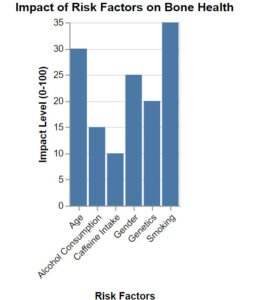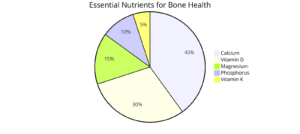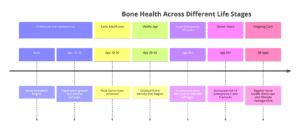
 Have you ever wondered about the secret to having strong, resilient bones? Look no further, because we have the answer for you – it’s all about boosting your bone health! In this article, we will explore the crucial role that bone health plays in maintaining a strong skeletal system. From the importance of calcium and vitamin D to the benefits of weight-bearing exercises, we’ll provide you with practical tips and insights to enhance your bone health and ensure a lifetime of strong and resilient bones. So, let’s get started on this bone-boosting journey together!
Have you ever wondered about the secret to having strong, resilient bones? Look no further, because we have the answer for you – it’s all about boosting your bone health! In this article, we will explore the crucial role that bone health plays in maintaining a strong skeletal system. From the importance of calcium and vitamin D to the benefits of weight-bearing exercises, we’ll provide you with practical tips and insights to enhance your bone health and ensure a lifetime of strong and resilient bones. So, let’s get started on this bone-boosting journey together!
Importance of Bone Health
Understanding the role of bones in the body
Bones are more than just repositories for calcium and other minerals; they are living tissues that play a vital role in our overall health and well-being. Beyond providing structural support and protecting our internal organs, bones serve as a storehouse for minerals, produce blood cells, and facilitate movement. They are constantly undergoing a process of remodeling, where new bone is formed and old bone is broken down. Understanding the importance of bone health is key to maintaining a strong and resilient skeletal system throughout our lives.
The consequences of poor bone health
Neglecting our bone health can have significant consequences. One of the most well-known conditions related to bone health is osteoporosis, a disease characterized by low bone mass and deterioration of bone tissue. Osteoporosis increases the risk of fractures, even from minor falls or bumps, leading to loss of independence, decreased mobility, and chronic pain. Poor bone health can also result in other conditions such as osteopenia, a precursor to osteoporosis, and delayed fracture healing. Therefore, prioritizing bone health is essential for maintaining a high quality of life.
Factors Affecting Bone Health
Age and its impact on bone health
Age plays a crucial role in determining bone health. During childhood and adolescence, bone density increases steadily, peaking around the age of 30. After that, bone density gradually decreases, making bones more susceptible to fractures and osteoporosis. This decline is more prominent in women, especially after menopause when estrogen levels decrease, affecting bone density. However, regardless of age, it is never too late to improve and maintain bone health through lifestyle changes and appropriate interventions.
The role of gender in bone health
Gender also influences bone health. Women have smaller and thinner bones than men, placing them at a higher risk for osteoporosis. The hormonal changes that occur during menopause further exacerbate this risk. Men, on the other hand, tend to have a higher peak bone mass and a slower rate of bone loss, providing them with an advantage in terms of bone health. However, it is important for both men and women to take proactive steps to maintain and protect their bones.
The influence of genetics on bone density
Genetics can also impact bone health. Individuals with a family history of osteoporosis or fractures may be more predisposed to these conditions. Genetic factors play a role in determining bone density, bone size, and bone turnover rate. While genetics cannot be changed, understanding your family history can help you make informed choices about lifestyle modifications and interventions to maintain bone health.

Nutrition and Bone Health
The importance of calcium for bone health
Calcium is one of the primary building blocks of bones, and its role in maintaining bone health cannot be overstated. Adequate calcium intake is crucial at all stages of life, particularly during childhood and adolescence when bones are growing rapidly. Good dietary sources of calcium include dairy products, leafy green vegetables, tofu, and fortified foods. If it is challenging to meet the recommended daily intake through diet alone, calcium supplements can be considered, especially for individuals with low calcium intake or specific medical conditions.
Vitamin D and its role in bone health
Vitamin D plays a crucial role in calcium absorption and bone formation. Without sufficient vitamin D, the body cannot effectively utilize calcium, leading to weakened bones. The primary source of vitamin D is sunlight, but it can also be obtained from certain foods like fatty fish, egg yolks, and fortified dairy products. In some cases, supplements may be necessary to ensure adequate vitamin D levels, especially for individuals with limited sun exposure or medical conditions that interfere with vitamin D metabolism.
Other essential nutrients for strong bones
While calcium and vitamin D take the spotlight, other nutrients also contribute to bone health. Magnesium, phosphorus, vitamin K, and zinc are examples of minerals and vitamins that support bone growth and maintenance. Including a variety of nutrient-rich foods in your diet, such as whole grains, nuts, seeds, fruits, and vegetables, can help ensure you obtain these essential nutrients and promote overall bone health.
Exercise and Bone Health
Weight-bearing exercises and bone density
Regular exercise is essential for maintaining healthy bones. Weight-bearing exercises, such as walking, jogging, dancing, and hiking, help stimulate the production of new bone tissue, thereby increasing bone density. These exercises put stress on the bones, forcing them to adapt and become stronger. Engaging in weight-bearing exercises for at least 30 minutes most days of the week is recommended to support bone health and reduce the risk of osteoporosis.
Strength training and bone health
In addition to weight-bearing exercises, strength training plays a vital role in bone health. Resistance exercises using weights, resistance bands, or body weight help stimulate bone growth and increase muscle strength, which further supports bone health. Incorporating strength training exercises, targeting major muscle groups, into your fitness routine two to three times a week can help maintain bone density and reduce the risk of fractures.
The benefits of low-impact exercises for bone health
For individuals with joint issues or conditions that restrict high-impact activities, low-impact exercises provide a viable alternative for improving bone health. Activities like swimming, cycling, and using elliptical machines are considered low-impact exercises that still offer benefits for bone health. Although these exercises may not have the same impact on bone density as weight-bearing exercise or strength training, they can still contribute to overall bone health and help maintain joint flexibility and muscle strength.

Lifestyle Choices and Bone Health
Smoking and its impact on bone health
Smoking tobacco is detrimental to bone health. It diminishes blood flow to bones, impairs the production of bone-forming cells, and disrupts the hormonal balance necessary for maintaining bone density. Smoking has been linked to an increased risk of fractures, delayed fracture healing, and reduced effectiveness of osteoporosis treatments. Quitting smoking is crucial for preserving bone health and reducing the risk of bone-related complications.
Alcohol consumption and bone density
Excessive alcohol consumption can also adversely affect bone health. Alcohol interferes with the body’s ability to absorb calcium and vitamin D and negatively impacts bone turnover. Chronic heavy drinking can lead to a decrease in bone density, making bones more fragile and prone to fractures. Limiting alcohol intake and drinking in moderation can help mitigate these risks and promote better bone health.
The effects of excessive caffeine intake on bones
While moderate caffeine consumption is generally safe, excessive caffeine intake may have a negative impact on bone health. Caffeine can increase urinary calcium excretion, potentially affecting calcium balance in the body. However, the evidence regarding caffeine’s adverse effects on bone health is inconclusive. Consuming caffeine in moderation, coupled with adequate calcium intake, is unlikely to have a significant impact on bone health for most individuals.
Hormonal Balance and Bone Health
The role of estrogen in maintaining bone density
Estrogen plays a crucial role in maintaining bone density, particularly in women. During menopause, a significant decline in estrogen production occurs, resulting in accelerated bone loss. This decline in bone density increases the risk of osteoporosis and fractures. Hormone replacement therapy (HRT) may be prescribed to postmenopausal women to compensate for estrogen deficiencies and protect bone health. However, the use of HRT should be evaluated on an individual basis, considering the associated risks and benefits.
The impact of menopause on bone health
Menopause marks a significant transition in a woman’s life, impacting bone health. As estrogen production decreases, bone loss accelerates, leading to greater susceptibility to osteoporosis and fractures. It is essential for women approaching or experiencing menopause to prioritize bone health through dietary measures, exercise, and regular medical check-ups. Bone density screenings may be recommended to assess the need for interventions or treatments to prevent or manage osteoporosis.
The relationship between hormones and osteoporosis
Hormonal imbalances can contribute to the development of osteoporosis in both men and women. Conditions such as hyperparathyroidism, Cushing’s syndrome, and thyroid disorders can disrupt the hormonal balance necessary for maintaining bone density. Additionally, certain medications used to treat these conditions may also negatively impact bone health. Close monitoring of hormonal levels, regular bone density evaluations, and appropriate medical interventions are crucial for individuals with hormonal imbalances to prevent or manage osteoporosis.
Prevention and Management of Bone Conditions
Steps to prevent bone loss and improve bone health
Prevention is key when it comes to maintaining bone health. Engaging in regular weight-bearing exercises and strength training, consuming a balanced diet rich in calcium and other essential nutrients, and avoiding tobacco use and excessive alcohol consumption are crucial steps in preventing bone loss. Additionally, maintaining a healthy body weight, managing stress, and prioritizing adequate sleep contribute to overall bone health. Being proactive and making lifestyle changes can significantly reduce the risk of developing bone-related conditions.
The importance of regular bone density screenings
Regular bone density screenings are essential for assessing bone health and identifying early signs of bone loss or osteoporosis. Dual-energy X-ray absorptiometry (DXA) scans are commonly used to measure bone mineral density and evaluate fracture risk. These screenings allow for early intervention and treatment if necessary. The frequency of bone density screenings may vary based on individual risk factors, but they are generally recommended for postmenopausal women and older adults.
Managing osteoporosis and other bone conditions
If diagnosed with osteoporosis or another bone condition, proper management is crucial to prevent further bone loss and reduce fracture risk. Treatment may involve a combination of lifestyle changes, such as increasing calcium and vitamin D intake, exercising regularly, and ensuring a balanced diet. In some cases, medications specifically designed to improve bone density may be prescribed. Working closely with healthcare professionals is essential to develop an individualized management plan that addresses the specific needs and challenges associated with each bone condition.
Supplements and Medications for Bone Health
Calcium and vitamin D supplements
 For individuals who struggle to obtain adequate calcium and vitamin D levels through diet alone, supplements may be recommended. Calcium carbonate and calcium citrate are commonly used calcium supplements, while vitamin D supplements are available in various forms. It is important to follow healthcare professionals’ guidance regarding supplement dosage and timing to ensure optimal absorption and avoid potential interactions with other medications.
For individuals who struggle to obtain adequate calcium and vitamin D levels through diet alone, supplements may be recommended. Calcium carbonate and calcium citrate are commonly used calcium supplements, while vitamin D supplements are available in various forms. It is important to follow healthcare professionals’ guidance regarding supplement dosage and timing to ensure optimal absorption and avoid potential interactions with other medications.
Prescription medications for osteoporosis
For individuals at a high risk of fractures or those with diagnosed osteoporosis, prescription medications may be necessary. Bisphosphonates, selective estrogen receptor modulators (SERMs), and monoclonal antibodies are examples of medications designed to improve bone density and reduce fracture risk. These medications are typically prescribed on an individual basis, taking into account factors such as age, gender, fracture risk, and medical history.
Other supplements for bone health
While calcium and vitamin D supplements are the most commonly recommended for bone health, other supplements may offer additional benefits. These include magnesium, phosphorus, vitamin K, and omega-3 fatty acids. However, it is important to approach supplementation with caution and consult healthcare professionals or registered dietitians to determine the appropriate dosage and ensure compatibility with other medications.
Maintaining Bone Health in Different Stages of Life
Childhood and adolescence: building strong bones
Building strong bones begins in childhood and adolescence. Adequate calcium intake, combined with regular physical activity, is crucial during these formative years. Encouraging children and adolescents to engage in weight-bearing exercises, such as jumping, running, and playing sports, helps promote the development of strong bones. Providing a nutrient-rich diet that includes calcium-rich foods, vitamin D sources, and other essential nutrients lays a solid foundation for optimal bone health later in life.
Adults: maintaining bone health and preventing loss
While peak bone density is typically reached in early adulthood, maintaining bone health remains important throughout adulthood. Continuing to engage in weight-bearing exercises, strength training, and maintaining a healthy diet are key to preventing age-related bone loss. Regular bone density screenings can help identify any changes or decline in bone density early on, allowing for timely interventions or treatments as needed.
Elderly individuals: strategies for maintaining bone density
As individuals age, the risk of osteoporosis and fractures increases significantly. Therefore, it is important for elderly individuals to prioritize bone health through a combination of lifestyle choices and appropriate interventions. Regular physical activity, especially exercises that improve balance and coordination, can help prevent falls and reduce the risk of fractures. A diet rich in calcium, vitamin D, and other essential nutrients should be maintained. Additionally, regular bone density screenings and medications to manage or treat osteoporosis may be necessary for some individuals.
Seeking Professional Guidance
Consulting a healthcare professional for personalized advice
When it comes to bone health, consulting a healthcare professional can provide personalized advice and guidance tailored to individual needs and circumstances. Healthcare professionals can assess risk factors, recommend appropriate interventions, and monitor bone health. Whether it is determining the need for supplements, discussing medications, or evaluating bone density scans, healthcare professionals play a crucial role in helping individuals make informed decisions.
Working with a nutritionist or dietitian to optimize bone health
Nutritionists and dietitians are valuable resources for optimizing bone health through diet. They can help assess dietary patterns, identify potential nutrient deficiencies, and develop personalized meal plans that prioritize bone health. Working with a nutritionist or dietitian can help individuals make informed choices about food selection, portion sizes, and nutrient supplementation, ensuring they are actively promoting bone health through proper nutrition.
Physical therapy for bone-related conditions
For individuals with bone-related conditions or those recovering from fractures or surgeries, physical therapy can be instrumental in promoting bone health and improving overall mobility and strength. Physical therapists can create individualized exercise programs that focus on strengthening muscles, improving flexibility, and optimizing balance and coordination. By addressing specific bone-related challenges, physical therapy can help individuals regain independence, reduce pain, and enhance overall quality of life.
In conclusion, bone health is of utmost importance for maintaining a healthy and active lifestyle at all stages of life. Understanding the role of bones in the body, as well as the factors that influence bone health, allows us to make informed choices to optimize bone health. Prioritizing adequate nutrition, regular exercise, and making positive lifestyle choices can significantly contribute to strong and resilient bones. By seeking professional guidance and staying proactive, we can work towards preventing bone conditions, managing existing ones, and ensuring lifelong bone health. So go ahead and take the necessary steps to boost your bone health today!

